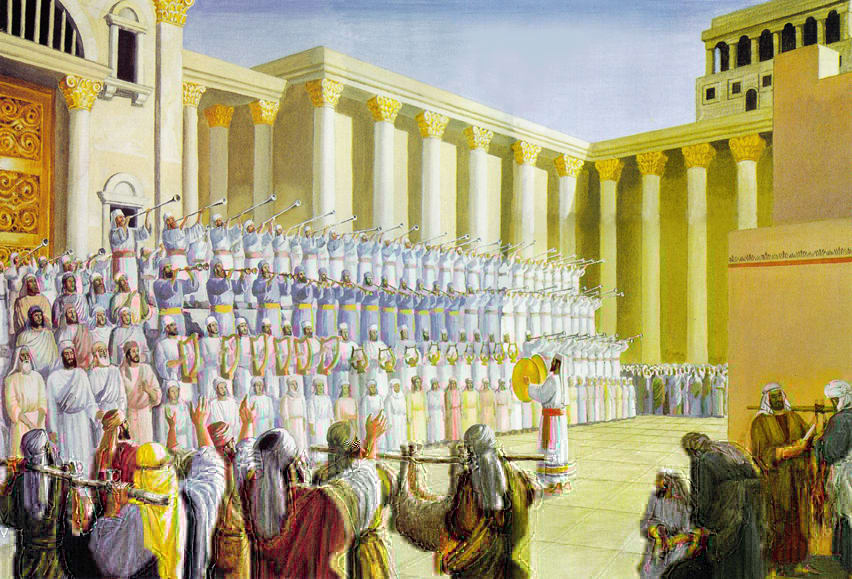Each day in the Temple the Levi’im used to sing a particular chapter of Tehillim at the time of the wine libation in the morning and late afternoon.
These songs are recorded in the Mishna at the very end of tractate Tamid (7:4). The Gemara (Rosh Hashana 31a) explains the choice of chapters by relating each day’s song to the events of the corresponding day of creation. (A similar explanation is found in Avot d’Rebbe Natan 1:8.)
Rambam (Order of Prayers) mentions that some communities had a custom of saying each day’s song after morning prayers, and today this custom is universal.
Actually, there is a dispute in the Yerushalmi if it is appropriate to recite these songs outside the time of the wine libation, at least in the Temple. Rebbe Yochanan asserts that it is permissible. His proof is that at the time of the destruction of the Temple, which tradition teaches was on a Sunday, the Levi’im sang the verse “And He shall return them according to their sin, and cut them off in their wickedness”. This verse, which belongs to psalm 94 recited on Wednesdays, was used in this case as a lamentation over the tragedy of the destruction. But Reish Lakish asserts that the Levi’im merely sang “yesterday’s song”. (Yerushalmi Ta’anit 4:5. According to one explanation this means they made a mistake.)
Tractate Soferim (18:1) presents us with Reish Lakish accepting Rebbe Yochanan’s proof; the ruling continues: “Therefore, the people are accustomed to reciting these songs in their [respective] times.”
This inference from Rebbe Yochanan is not obvious. It is true that Rebbe Yochanan asserts that we may recite the song of the day even without the wine libation. But Rebbe Yochanan also maintains that when we do so, we don’t necessarily have to say the song customary for that day; rather, we may say a psalm appropriate to “current events”, just as the Levi’im at the time of the destruction recited mournful verses appropriate to the tragic events. It seems that the message is that the particular commemoration of the stages of creation are suited to the days of the week inherently, and not only because this was the custom in the time of the Temple. The stages of the creation of the world, culminating in the Shabbat, are also stages in our everyday existence: First, recognizing God’s primacy (the message of chapter 24); then recognizing his involvement in the creation (the message of chapter 48); afterwards, recognizing that the basis of creation is justice among human beings (chapter 82); the recognition that only He is worthy of worship (chapter 94); that His sovereignty is beneficent for all creatures (chapter 81); and that man is the pinnacle of creation (chapter 93). Finally, we recognize that the world is subject to perfection and is destined to be perfected in the Shabbat of the World to Come (chapter 92).
While the passage from Soferim explains the “song of the day” as a commemoration of the Temple service, the inference from Rebbe Yochanan, who makes a point of stating that the song is not inherently connected to the libations, seems to make the point that our recitation of the songs today is related especially to the ongoing unfolding of the stages of creation and the weekly cycle. This understanding is strengthened by the special introduction we say to each chapter: “Today is such-and- such a day of the week, on which the Levi’im used to say…”. The commentators explain that this introduction is meant to remind us of Shabbat each day, so that we recall that each day stands in a particular relation towards the ultimate completion and perfection of the world.
Rabbi Asher Meir is the author of the book Meaning in Mitzvot, distributed by Feldheim. The book provides insights into the inner meaning of our daily practices, following the order of the 221 chapters of the Kitzur Shulchan Arukh.
The words of this author reflect his/her own opinions and do not necessarily represent the official position of the Orthodox Union.



